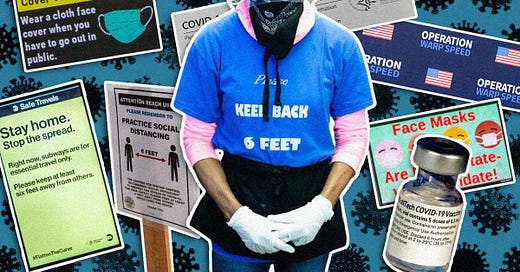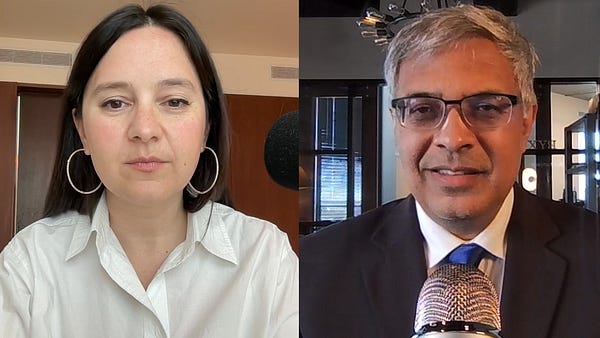
The Free Press

Since age 15, I have experienced exhaustion, indigestion, and recurring nausea. I was grateful when I got into Princeton, but when I arrived, I couldn’t keep my eyes open in lectures—despite sleeping over twelve hours every night.
I cried daily and suddenly, say, when I was reading a dense Supreme Court opinion for my politics courses. (In my defense, our Constitutional Interpretation course is historically known for its harsh grading.) Although my diet was consistent, my weight fluctuated and my clothes were either too baggy or too tight.
And yet, rounds of blood work suggested I was healthy. I was prescribed antidepressants so that I might make friends, and Adderall so that I might remain focused. Friends, roommates, and family members agreed that I needed to “toughen up” since “everything is fine.”
By the spring of my junior year, I felt suicidal. I couldn’t remember the energetic girl I used to be, and I couldn’t imagine a desirable future. I assumed there was something psychologically wrong with me, since doctors repeatedly insisted I was healthy. I told my parents I should withdraw from the semester and be admitted to a mental institution.
But my parents told me I was suffering from perfectionist tendencies and an obsession with good grades. They instructed me to “stop being hysterical” and “pull myself together.”
By some miracle—probably Adderall—I finished the semester with As in five courses and a 30-page independent research project. My academic success reinforced the notion that I was healthy and capable of self-control.
Then, in March 2023 of my senior year, I woke up with a stabbing pain near my right hip. The pain intensified even after Advil, so I admitted myself to the university’s healthcare center, then was rushed to the emergency room for appendicitis. A nurse gave me morphine while I waited for scans. The results returned completely normal, so I was sent back to campus. But even with the painkillers, I felt as though I had swallowed a knife. One ER doctor suggested that I was “maybe just having a bad menstrual cycle.”
But I knew something was wrong—even if the ER doctors didn’t.
Throughout March, I traveled to New York for appointments with a gynecologist, where I explained my symptoms: a chronic pins and needles sensation in my stomach, recurring indigestion, and unending exhaustion. I also relayed my chaotic menstrual history: I had my period for six months straight, then every two weeks, then not at all for months. Previous doctors assumed that instability resulted from years of maintaining a low weight as a ballet dancer.
The gynecologist performed an ultrasound—which basically involves inserting a slim probe with a camera into the vagina—and it was excruciating. I winced and dug my nails into the bed. Nothing remarkable appeared on the screen, but my pain clearly indicated that something was wrong. The doctor frowned at me and removed the probe. My stomach tingled from the gentle prodding, as if teeny fireworks were exploding inside of me.
The doctor told me he couldn’t see anything on the ultrasound—no cysts, no fibroids, no tumors. And that was the clue to my diagnosis.
“The ultrasound shouldn’t hurt, at least not this much,” my doctor said. “I’m pretty confident that you have endometriosis.”
I didn’t know what endometriosis meant; it sounded like a pasta dish. Yet I embraced the term. At last, I had a name for years of agony and a justification for my complaints.
Although I was still in pain, I felt as though a weight had been lifted off my chest. I wanted to wave my doctor’s note in the air and proclaim, “I’m not crazy! There is something wrong!”
Finally, I knew the problem was in my body, not my head, and at least one person believed me.
But still, I was angry—resentful, even. I had exhibited nearly all the symptoms since I was a teenager, and my severe case should have been detected much earlier. A country fixated on reproductive rights should also be concerned about reproductive disorders. Why did it take so long to be diagnosed?
Most people who have heard of endometriosis think it’s experiencing really awful periods, but that’s just one symptom. It’s actually a disease where cells—similar to those shed during menstruation—grow outside the uterus and cannot leave the body. The tissue often appears around the ovaries, fallopian tubes, and pelvis, but it can spread to the vagina, rectum, cervix, intestines, bladder, breasts, lungs, and in extremely rare cases, even the brain. There are no known causes or cures, and it almost never can be detected by any scans. An estimated 30 to 50 percent of women with endometriosis also experience infertility.
Endometriosis—the word stems from the Greek endo, “inside”; metra, “uterus”; and osis, “condition”—affects roughly ten percent of reproductive-age females, making it about as common as diabetes in women. The tissue has been found in female fetuses, prepubescent girls, and women who have never menstruated. It’s nearly entirely a female disease. (A 2018 study reported fewer than 20 documented cases in males.)
The medical field is largely uninformed about endometriosis, and doctors ignore symptoms because “painful” periods are perceived as a “normal” part of being a woman. Studies estimate that the average delay in receiving an endometriosis diagnosis is somewhere between three to eleven years, although some patients wait decades. A 2020 study found that 75 percent of endometriosis patients are misdiagnosed with another physical and/or mental condition before they are correctly diagnosed. Common misdiagnoses include irritable bowel syndrome or chronic pelvic pain syndrome. It can’t all be chalked up to the “patriarchy”; today about 85 percent of gynecologists are women.
“About a third of my patients self-diagnose and refer themselves to see me. Doctors have sent them on a wild-goose chase, so they start doing their own research,” Dr. Laurence Orbuch, a surgeon and director of GYN Laparoscopic/Robotic Associates LA in California, told The Free Press.
“I’ve had patients whose psychiatrists and psychotherapists have gotten fed up with them and told them that it’s made up, it’s all in their head. And it is unconscionable, but you hear this all the time.”
Consider it a modern case of “hysterical” women.
In the fifth century BCE, Hippocratic physicians identified disorders like anxiety and tremors in women as resulting from a “wandering womb” in search of “hydration.” These mistaken theories of a supposedly unhealthy womb evolved into the overly broad notion of “hysteria”—from the Greek hystera, meaning “womb” or “uterus”—which was applied to women who were considered irrational.
Today, we’ve abandoned the “wandering womb” theory, but doctors still perceive women as hysterical. Female patients with abdominal pain in the ER are treated with disregard: one study found that, even with similar pain scores, women are less likely to receive painkillers and wait longer to get them than their male counterparts. Women are more likely to be told by medical professionals that their pain is “emotional” or “psychogenic,” and they are more likely than men to be given recommendations for psychological treatment, even when presenting similar symptoms.
“So many of these patients are blown off and dismissed so many times with their experiences invalidated,” Orbuch told me about endometriosis sufferers. “They just give up, retreat in life, and just live in misery.”
We’re hosting our first live debate on September 13 at the Ace Theatre in Los Angeles! Has the sexual revolution failed? Come argue about it and have a drink. We can’t wait to meet you in person. You can purchase tickets now at thefp.com/debates.
The two most common surgical treatments for endometriosis are excision and ablation. Excision removes the tissue, while ablation merely burns the surface of the lesions.
Doctors agree that excision is the superior treatment because the recurrence rates plummet. Women treated with ablation are much more likely to undergo surgery again.
But surgeons are encouraged to burn the cells rather than cut them out because it’s a simpler procedure—and they can only charge insurers for the cost of ablation. If patients want excision, they almost always have to go out of network.
“The unfortunate reality is that not enough patients are offered surgery who would benefit from surgery,” Dr. Melissa McHale, a Maryland-based gynecologic surgeon specializing in endometriosis excision, said. She added that there are not enough “skilled and willing surgeons” to perform the procedure.
Sometimes patients are told they received an excision when the lesions were, in fact, burned. “The pathology report will show they merely took a biopsy to have tissue diagnoses, and then just burned everything,” Orbuch said. The doctors have “lied to the patient and said it was a true excision surgery.”
And so, women with endometriosis face two challenges: getting diagnosed, then avoiding medical malpractice.
Doctors also recommend birth control instead of surgery to mitigate the symptoms—but it’s not a quick fix. "People think that’s a treatment. It’s not. It may diminish the painful periods, but the endometriosis persists and progresses,” Orbuch told The Free Press.
My doctor encouraged me to have an excision. I was told that during the laparoscopic surgery, a camera would be inserted through a small cut below my belly button, then robots would be used to sever the tissue. Still, I worried that maybe the doctors would slice me open and find nothing, or discover only a single tiny lesion.
But I kept my fears to myself.
On May 11, 2023, three weeks before my college graduation, I was strapped onto the operating table in an eerily sterile room, then everything went black.
I woke up in a new room with my parents beside me. I didn’t know if three minutes or three days had passed.
“You’re very lucky,” my dad said. “Your fallopian tubes were fine.”
“So, did I have endometriosis?” I asked.
“You had it everywhere,” my mom responded.
“They said it was ‘overload,’ ” my dad added. “But they got it all out.”
“We’re so sorry,” my mom said.
When surgeons checked up on me, I learned that I had the worst possible condition at stage 4, which is measured by the amount, depth, and location of the tissue. My doctors were “horrified” by the severity: the tissue had spread across eight organs in nearly thirty spots. One surgeon sliced open then stitched up my bowels, while another removed my appendix because it was blanketed with endometriosis.
“You’ve been desensitized to the pain for so long,” one surgeon told me. “You’re going to feel like a new person.”
But at first, I felt like the worst version of myself. Because the doctors had filled my stomach with gas to inflate my body and allow more room for the surgery, it afterward tried to escape from every crevice in my body. I was on a liquid diet and vomited constantly for days. Every sneeze felt like a gunshot to the abdomen. I spent weeks in bed—a devastating situation for someone who had previously danced eight hours a day. My hair fell out in clumps, likely because of the hormone fluctuations and sudden weight loss, so I covered my head with scarves.
I was so weak, I attended my college graduation in a wheelchair. My mother pushed me around the ceremonies, while I sensed my classmates staring at me and wondering, “What happened to her? She was in lectures last month.”
Friends (and internet strangers) sent me well-intentioned messages saying I was an “endo warrior”—one of the many women who once felt silenced, yet are now raising online awareness about the disease. But I felt like a wounded soldier, hardly able to move.
Although the difficult healing process spanned nearly two months, my doctor was right: I now feel like I’ve been given a new body—and with it, a new life. Really, I’ve resuscitated the girl I once was—a girl who was happy.
I just have one regret.
I wish I had done it years ago. But everyone thought I was crazy.
Abigail Anthony (@abigailandwords) is a summer intern at The Free Press.
And for more honest reporting about health, become a Free Press subscriber today:

















Abigail,
Thank you so much for this article. I read it when it was first published and immediately sent it to my 21 yo daughter. She has been experiencing various health issues for years. We thought she had finally found the root cause (allergies) but there was something about reading your story that sparked a feeling of urgency to revisit the nagging feeling I have had off and on since she started her (horrifically painful) periods that she might have endometriosis. Long story short, she just had excision surgery today with one of the top endo surgeons in the country. Your choice to share your experience is without a doubt the reason she was able to get the help she needed instead of going through years of mystery pain and the other potential problems of undiagnosed endo. I believe that God is in the details of our lives and I definitely see it in this circumstance. Thank you to you and to the Free Press for publishing this.
There is an early-stage company called Endosure with a diagnostic device that has gone through clinical trials.